Filter by

Reproductive Technology and Surrogacy
During the past few years, reproductive technology and surrogacy have emerged in a number of European countries as issues of debate. There has been a steady increase in the use of reproductive technology in the Nordic countries, as well as an increase in the use of cross-border medical treatment in order to achieve pregnancy. At the same time, a number of ethical issues have been raised concern…
- Edition
- -
- ISBN/ISSN
- 9789289342889
- Collation
- -
- Series Title
- TemaNord
- Call Number
- 340 NOR r
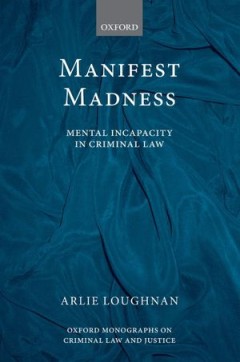
Manifest Madness : Mental incapacity in The Criminal Law
Whether it is a question of the age below which a child cannot be held liable for their actions, or the attribution of responsibility to defendants with mental illnesses, mental incapacity is a central concern for legal actors, policy makers, and legislators when it comes to crime and justice. Understanding the terrain of mental incapacity in criminal law is notoriously difficult; it involves t…
- Edition
- -
- ISBN/ISSN
- 9780199698592
- Collation
- -
- Series Title
- -
- Call Number
- 340 LOU m
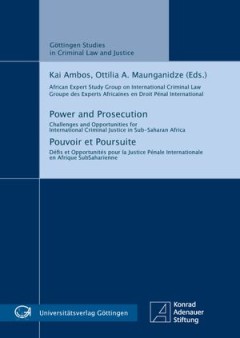
Power and Prosecution : Challenges and opportunities for international crimin…
This book contains some of the papers that were presented at the first meeting of the newly formed African Expert Study Group on International Criminal Law / Groupe des Experts Africaines en Droit Pénal International held in September 2011 in Brussels, Belgium. The group was established under the auspices of the Multinational Development Policy Dialogue (hereinafter ‘MDPD’) and the Rule of…
- Edition
- -
- ISBN/ISSN
- 9783863950781
- Collation
- -
- Series Title
- -
- Call Number
- 340 POW
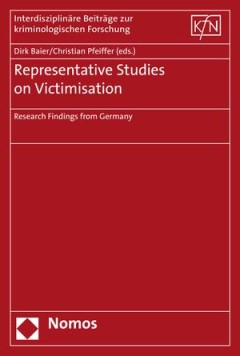
Representative Studies on Victimisation : Research Findings from Germany
This paper uses the German official Police Crime Statistics to draw conclusions on the prevalence of crime in Germany, the age dependency of crime, and crime trends in the last few decades. The Police Crime Statistics allow an analysis of crime that is finely divided by types of offence and in some cases reaches far back into the past. This advantage comes with a major handicap: The statistics …
- Edition
- 1
- ISBN/ISSN
- 9783845273679
- Collation
- 308 halaman
- Series Title
- Law / Criminal Law
- Call Number
- 364 BAI r

Dealing with Uncertainties in Policing Serious Crime
Grappling with uncertainties is at the heart of investigating serious crime. At a time when such crime is becoming more complex and resources are increasingly stretched, this book draws together research and practice perspectives to review fruitful approaches to uncertainties and to chart the way forward. Scene setting chapters describe the consequences of globalisation and the spread of sophis…
- Edition
- -
- ISBN/ISSN
- 9781921666377
- Collation
- -
- Series Title
- -
- Call Number
- 340 DEA

Business and the Risk of Crime in China
The book analyses the results of a large scale victimisation survey that was conducted in 2005-06 with businesses in Hong Kong, Shanghai, Shenzhen and Xi’an. It also provides comprehensive background materials on crime and the criminal justice system in China. The survey, which measured common and non-conventional crime such as fraud, IP theft and corruption, is important because few crime vi…
- Edition
- -
- ISBN/ISSN
- 9781921862540
- Collation
- -
- Series Title
- Asian Studies Series Volume: 3
- Call Number
- 340 BRO b
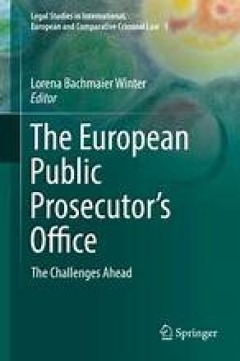
The European Public Prosecutor's Office
This book explores the European Public Prosecutor’s Office (EPPO), the creation of which was approved in the Regulation adopted by the Justice and Home Affairs (JHA) Council on 12 October 2017. The EPPO will be an independent European prosecution office tasked with investigating and prosecuting those crimes defined in the recently adopted Regulation 2017/1371 on combating fraud against th…
- Edition
- 1
- ISBN/ISSN
- 978-3-319-93916-2
- Collation
- XVIII, 279
- Series Title
- Legal Studies in International, European and Comparative Criminal Law
- Call Number
- -
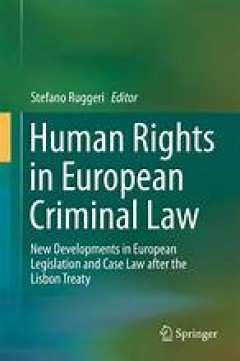
Human Rights in European Criminal Law
This book deals with human rights in European criminal law after the Lisbon Treaty. Doubtless the Lisbon Treaty has constituted a milestone in the development of European criminal justice. Not only has the reform following the Treaty given binding force to the EU Charter of Fundamental Rights, but furthermore it has paved the way for unprecedented forms of supranational legislation. In this sce…
- Edition
- 1
- ISBN/ISSN
- 978-3-319-12042-3
- Collation
- X, 317
- Series Title
- -
- Call Number
- -
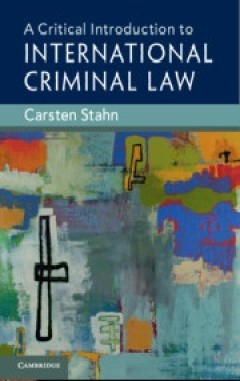
A Critical Introduction to International Criminal Law
International criminal law has witnessed a rapid rise after the end of the Cold War. The United Nations refers to the birth of a new 'age of accountability', but certain historical objections, such as selectivity or victor's justice, have never fully gone away, and many of the justice dimensions of international criminal law remain unexplored. Various critiques have emerged in socio-legal schol…
- Edition
- -
- ISBN/ISSN
- 9781108399906
- Collation
- -
- Series Title
- -
- Call Number
- -
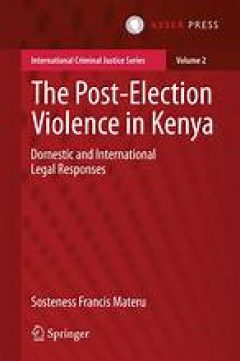
The Post-Election Violence in Kenya
Since the historic Nuremberg Trial of 1945 an international customary law principle has developed that commission of a core crime under international law – war crimes, genocide, crimes against humanity and aggression – should not go unpunished. History shows, that when in Africa such violations occurred, especially as a result of election disputes, national and regional actors, including…
- Edition
- 1
- ISBN/ISSN
- 978-94-6265-041-1
- Collation
- XVIII, 275
- Series Title
- International Criminal Justice Series
- Call Number
- -
 Computer Science, Information & General Works
Computer Science, Information & General Works  Philosophy & Psychology
Philosophy & Psychology  Religion
Religion  Social Sciences
Social Sciences  Language
Language  Pure Science
Pure Science  Applied Sciences
Applied Sciences  Art & Recreation
Art & Recreation  Literature
Literature  History & Geography
History & Geography